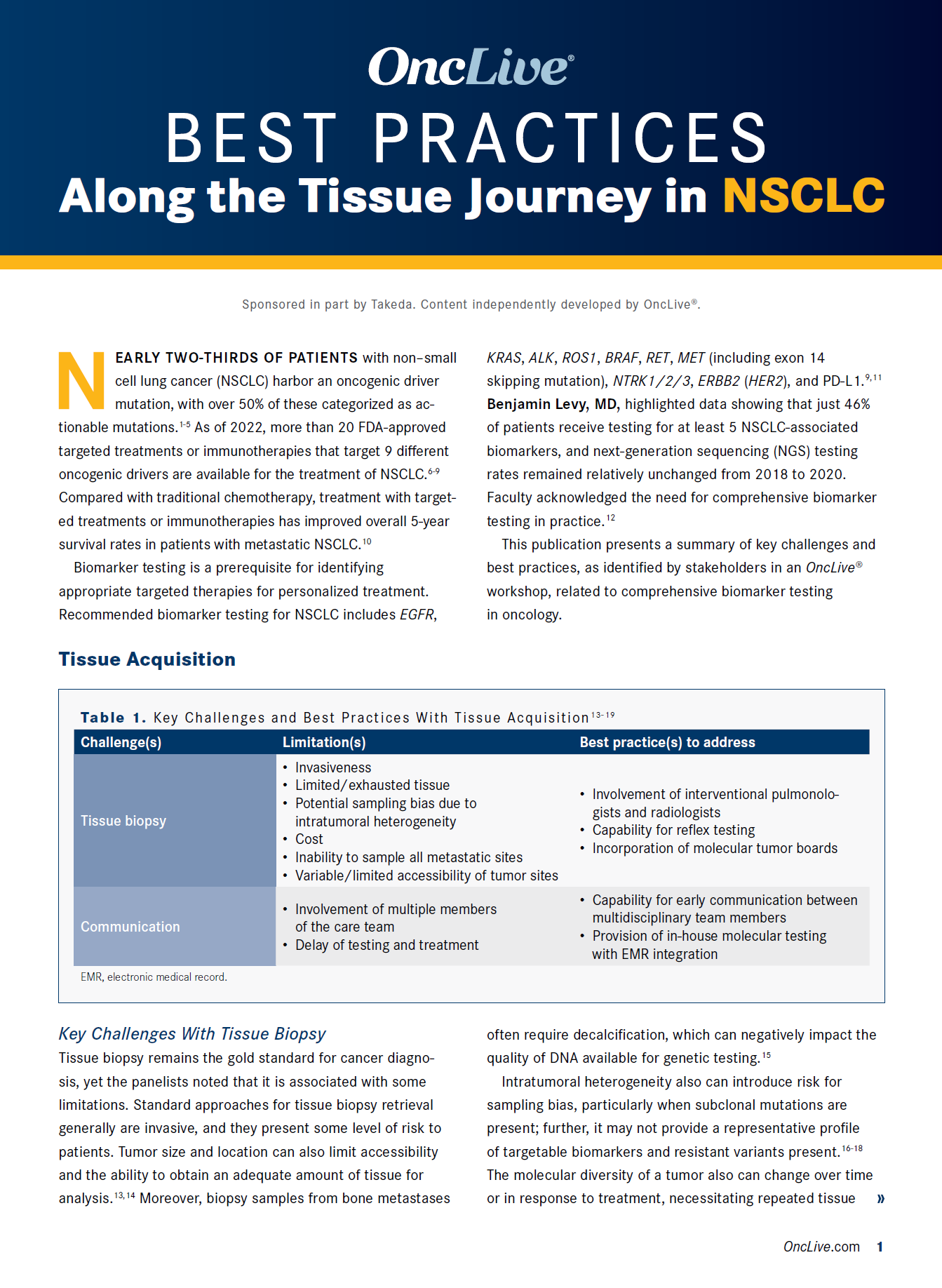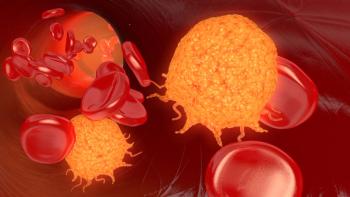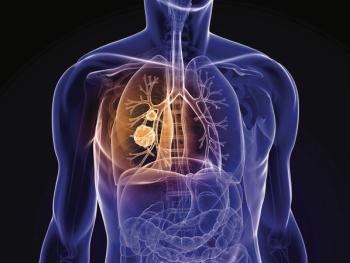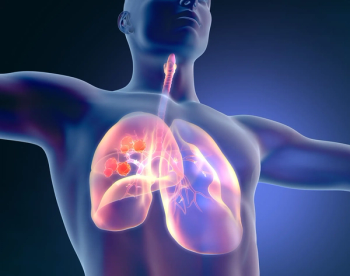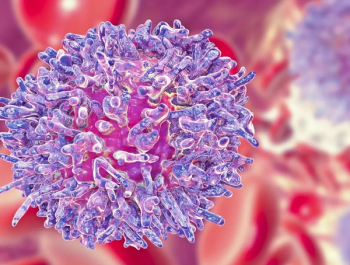
Best Practices Along the Tissue Journey in NSCLC
References
1. Vu P, Patel, SP. Non-small cell lung cancer targetable mutations: present and future. Precis Cancer Med. 2020;3. doi:10.21037/pcm.2019.11.03
2. Rotow J, Bivona TG. Understanding and targeting resistance mechanisms in NSCLC. Nat Rev Cancer. 2017;17(11):637-658. doi:10.1038/nrc.2017.84
3. Russo A, Franchina T, Ricciardi GR, et al. A decade of EGFR inhibition in EGFR-mutated non small cell lung cancer (NSCLC): old successes and future perspectives. Oncotarget. 2015;6(29):26814-26825. doi:10.18632/oncotarget.4254
4. Jordan EJ, Kim HR, Arcila ME, et al. Prospective comprehensive molecular characterization of lung adenocarcinomas for efficient patient matching to approved and emerging therapies. Cancer Discov. 2017;7(6):596-609. doi:10.1158/2159-8290.CD-16-1337
5. Chevallier M, Borgeaud M, Addeo A, Friedlaender A. Oncogenic driver mutations in non-small cell lung cancer: past, present and future. World J Clin Oncol. 2021;12(4):217-237. doi:10.5306/wjco.v12.i4.217
6. Adib E, Nassar AH, Abou Alaiwi S, et al. Variation in targetable genomic alterations in non-small cell lung cancer by genetic ancestry, sex, smoking history, and histology. Genome Med. 2022;14(1):39. doi:10.1186/s13073-022-01041-x
7. VanderLaan PA, Rangachari D, Costa DB. The rapidly evolving landscape of biomarker testing in non-small cell lung cancer. Cancer Cytopathol. 2021;129(3):179-181. doi:10.1002/cncy.22334
8. List of targeted therapy drugs approved for specific types of cancer. National Cancer Institute. Updated August 16, 2022. Accessed August 29, 2022.
9. Majeed U, Manochakian R, Zhao Y, Lou Y. Targeted therapy in advanced non-small cell lung cancer: current advances and future trends. J Hematol Oncol. 2021;14(1):108. doi:10.1186/s13045-021-01121-2
10. Mileham KF, Schenkel C, Bruinooge SS, et al. Defining comprehensive biomarker-related testing and treatment practices for advanced non-small-cell lung cancer: results of a survey of U.S. oncologists. Cancer Med. 2022;11(2):530-538. doi:10.1002/cam4.4459
11. Aisner, DL, Riely GJ. Non-small cell lung cancer recommendations for biomarker testing and treatment. J Natl Compr Canc Netw. 2021;19(5.5):610-613. doi: 10.6004/jnccn.2021.5020
12. Robert NJ, Nwokeji ED, Espirto JL, et al. Biomarker tissue journey among patients (pts) with untreated metastatic non-small cell lung cancer (mNSCLC) in the U.S. Oncology Network community practices. J Clin Oncol. 2021;39(suppl 15):9004. doi:10.1200/JCO.2021.39.15_suppl.9004
13. Francis G, Stein S. Circulating cell-free tumour DNA in the management of cancer. Int J Mol Sci. 2015;16(6):14122-14142. doi:10.3390/ijms160614122
14. Bidard FC, Weigelt B, Reis-Filho JS. Going with the flow: from circulating tumor cells to DNA. Sci Transl Med. 2013;5(207):207ps14. doi:10.1126/scitranslmed.3006305
15. Remon J, Caramella C, Jovelet C, et al. Osimertinib benefit in EGFR-mutant NSCLC patients with T790M-mutation detected by circulating tumour DNA. Ann Oncol. 2017;28(4):784-790. doi:10.1093/annonc/mdx017
16. Gerlinger M, Rowan AJ, Horswell S, et al. Intratumor heterogeneity and branched evolution revealed by multiregion sequencing. N Engl J Med. 2012;366(10):883-892. doi:10.1056/NEJMoa1113205
17. Perakis S, Speicher MR. Emerging concepts in liquid biopsies. BMC Med. 2017;15(1):75. doi:10.1186/s12916-017-0840-6
18. Lin L, Lin DC. Biological significance of tumor heterogeneity in esophageal squamous cell carcinoma. Cancers (Basel). 2019;11(8):1156. doi:10.3390/cancers11081156
19. Arnaud A. Cost and outcomes comparison of tissue and blood based biopsies for the purpose of biomarker testing. Value Health. 2016;19(3):PA143-A144. doi:10.1016/j.jval.2016.03.1556
20. Heydt C, Wölwer CB, Velazquez Camacho O, et al. Detection of gene fusions using targeted next-generation sequencing: a comparative evaluation. BMC Med Genomics. 2021;14(1):62. doi:10.1186/s12920-021-00909-y
21. Benayed R, Offin M, Mullaney K, et al. High yield of RNA sequencing for targetable kinase fusions in lung adenocarcinomas with no mitogenic driver alteration detected by DNA sequencing and low tumor mutation burden. Clin Cancer Res. 2019;25(15):4712-4722. doi:10.1158/1078-0432.CCR-19-0225
22. de Matos LL, Trufelli DC, Luongo de Matos MG, da Silva Pinhal MA. Immunohistochemistry as an important tool in biomarkers detection and clinical practice. Biomark Insights. 2010;5:9-20. doi:10.4137/bmi.s2185
23. Suh JH, Johnson A, Albacker L, et al. Comprehensive genomic profiling facilitates implementation of the National Comprehensive Cancer Network guidelines for lung cancer biomarker testing and identifies patients who may benefit from enrollment in mechanism-driven clinical trials. Oncologist. 2016;21(6):684-691. doi:10.1634/theoncologist.2016-0030
24. Suda K, Mitsudomi T. Emerging oncogenic fusions other than ALK, ROS1, RET, and NTRK in NSCLC and the role of fusions as resistance mechanisms to targeted therapy. Transl Lung Cancer Res. 2020;9(6):2618-2628. doi:10.21037/tlcr-20-186
25. Choudhury Y, Tan MH, Shi JL, et al. Complementing tissue testing with plasma mutation profiling improves therapeutic decision-making for patients with lung cancer. Front Med (Lausanne). 2022;9:758464. doi:10.3389/fmed.2022.758464
26. Warner JL, Jain SK, Levy MA. Integrating cancer genomic data into electronic health records. Genome Med. 2016;8(1):113. doi:10.1186/s13073-016-0371-3
27. Schwartzberg L, Kim ES, Liu D, Schrag D. Precision oncology: who, how, what, when, and when not? Am Soc Clin Oncol Educ Book. 2017;37:160-169. doi:10.1200/EDBK_174176
28. Allen TC. Payment for cancer biomarker testing. Arch Pathol Lab Med. 2015;139(3):300-304. doi:10.5858/arpa.2014-0190-ED
29. Thariani R, Veenstra DL, Carlson JJ, Garrison LP, Ramsey S. Paying for personalized care: cancer biomarkers and comparative effectiveness. Mol Oncol. 2012;6(2):260-266. doi:10.1016/j.molonc.2012.02.006


